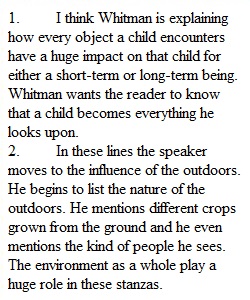


Q “There Was a Child Went Forth” FYI: The words in bold provide a bit of help with the poem. 1. The first four lines of the poem (copied below) provide the “thesis” of the poem. Notice the phrases that I have highlighted. What do you think Whitman is saying about the different objects a person encounters in his or her lifetime? In other words, paraphrase the thesis of the poem, focusing on the highlighted portions. There was a child went forth every day, And the first object he look’d upon, that object he became, And that object became part of him for the day or a certain part of the day, Or for many years or stretching cycles of years. In lines five – eighteen, the speaker catalogues the various things that become a part of this child. Notice that the images / items in these two stanzas come from nature or from small town life. The description here is beautiful. I think Whitman uses adjectives such as “early,” “Third-month,” “Fourth-month,” “Fifth-month,” “Winter-grain,” etc. to high-light the cyclical nature of life. When he moves from the country to the town, he mentions a variety of people that the child may encounter. 2. Read lines 19-29. What influence does the speaker move to in these lines? Summarize briefly what he is saying here. What about the line “Affection that will not be gainsay’d, the sense of what is real, the thought if after all it should prove unreal”? Take a shot at interpreting this in light of the other lines. Think in terms of the uncertainty of growing up and leaving home. By the way, “gainsay’d” means “contradicted.” Beginning in line 30, the images now become those of hurried city life, and then the speaker finally moves to the river and then the ocean. 3. Consider the progression of the poem – from morning to night, through the seasons of the year, from country to village to city to the peaceful ocean. Why do you think Whitman has the child progress this way? Is this a good picture of how a person progresses through life? Explain your “yes” or “no.” What experience / image / object could you relate to most? Please be sure to give at least one specific personal “stand-out” from the poem. 4. Focusing on the final line of the poem, briefly restate in your own words what Whitman has expressed in this poem. What do you make of the fact that he keeps the term child, even though the child has obviously grown? “When I Heard the Learn’d Astronomer” 1. Describe the learn’d astronomer and what he symbolizes. Consider how carefully Whitman sets up the scene in the first four lines. 2. Summarize lines 5 – 9. What soon happens as the speaker listens to the learn’d astronomer? 3. What connection do you see with Emerson and transcendentalism? I find that students love this poem. They can relate to getting bored in the classroom and finding themselves “rising and gliding out” of the classroom in their minds.
View Related Questions